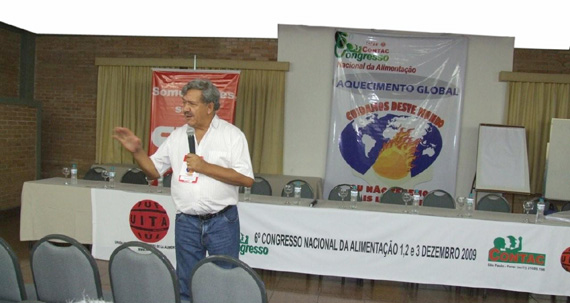With Siderlei de Oliveira
Who bought Parmalat Brasil?
Parmalat Brasil was an exception in the global
crisis that this transnational corporation suffered
in 2004, as it remained generally stable throughout.
But its recent purchase by an as-of-yet undisclosed
buyer has stirred up the waters again. CONTAC
president Siderlei de Oliveira spoke with
Sirel about this situation and his expectations for the
upcoming IUF Global Dairy Conference.
-The company met last week for the first time with
the National Committee of Parmalat workers…?
-Yes,
because the sale was made public. We still don't
know who the buyer is; it could be a transnational
corporation from the dairy sector or a food industry
company.
-We're seeing this kind of process in many
countries…
-And in Brazil,
after
the avian influenza, many poultry companies realized
that they had to diversify production so as not to
depend on a single segment.
For that reason,
Perdigão -one of the largest poultry producers in
Brazil, which merged with Sadiá last year to form
Brasil Foods-
purchased
Batávia,
owner of the
Batavo
brand, and
Eleva
Alimentos,
whose portfolio includes the
Elegê
brand.
And it's not just
Perdigão
that's diversifying; there are a lot of large
companies in Brazil that see dairy production as
a lucrative and growing sector.
The
trend is towards acquiring companies with well-known
brands, and preying on units that are having
financial problems.
-What happened with Parmalat?
-In Brazil we were able to overcome the
crisis that hit the transnational corporation in
2004. We formed a
National Committee of Parmalat Workers
and met with government authorities -we even met
with President Luiz Inácio “Lula” da Silva
himself. And our demand was that the company not be
sold "in pieces," because that would put our jobs at
serious risk.
As the
IUF
knows, I was part of a committee formed by the
government of Brazil, which traveled to
Italy to discuss the situation of
Parmalat.
That was how I was able to meet with
Enrico
Bondi,
the general liquidator appointed by the Italian
government for
Parmalat,
and I was the first trade unionist to have that
opportunity.
-And the Committee did a good job…?
-It did. Thanks to the Brazilian government's
mediation and the actions of that Committee, plus
the efforts by producers, we were able to maintain
all the plants open and prevent any job losses.
-This proves that when workers unite and mobilize
they can achieve a great deal…
-It was proved once again. When the crisis hit,
CUT and Fuerza Sindical members put their
historical differences aside to focus on defending
the workers' jobs and demands.
And not only did we prevent plant closures or job
cuts, we secured a national agreement through which
we negotiated salaries that were even better than
those in sectors not in crisis.
-Once again, this shows that trade unions are
capable of joining in action when they're in deep
water…
-(Laughter) Well, sometimes even when they're not
that deep…
-Now Parmalat is in a worse situation than in 2004,
and we can draw another conclusion: anyone coming
from outside the dairy sector and attempting to
manage a dairy company as if it were any other
industry…
-Goes bankrupt! That's what happened with
Laep
Investments,
who took over
Parmalat
in July 2009. An entrepreneur who comes into the
sector without any knowledge of it, who's only in to
make a quick buck, fails.
Parmalat
was taken over by
Laep,
which had done a good job in the cleaning sector
with
BomBril,
but it failed in the dairy business.
Today
Parmalat
is a solid brand, without production and without the
capacity to meet customer demand. This talk about it
being sold is a good thing, but it depends on who's
buying... I just hope it's not
Nestlé...
-Why?
-I
don't need to tell you that! (Laughter).
It means more concentration of production, less
jobs, fewer producers... among other things. Let's
hope it's a company that's looking to expand in the
sector, and will compete and generate other
opportunities that won't be available with
Nestlé.
-What are your expectations for the IUF Global Dairy
Conference?
-I hope to find something different there. And I
think this conference will be different. An activity
like this is very important, and to be able to learn
beforehand through
Sirel
and the
Rel-UITA
(IUF Latin America) website about the problems faced
by the sector in other countries, and get to know
several of the delegates and their take on the
sector, is key.
Also, I trust ATILRA and its organizing
capacity. It'll be a major event and I hope that the
dairy sector in the IUF will come out
stronger, and that it will achieve a structure like
the hotel, tobacco and agricultural workers have.
